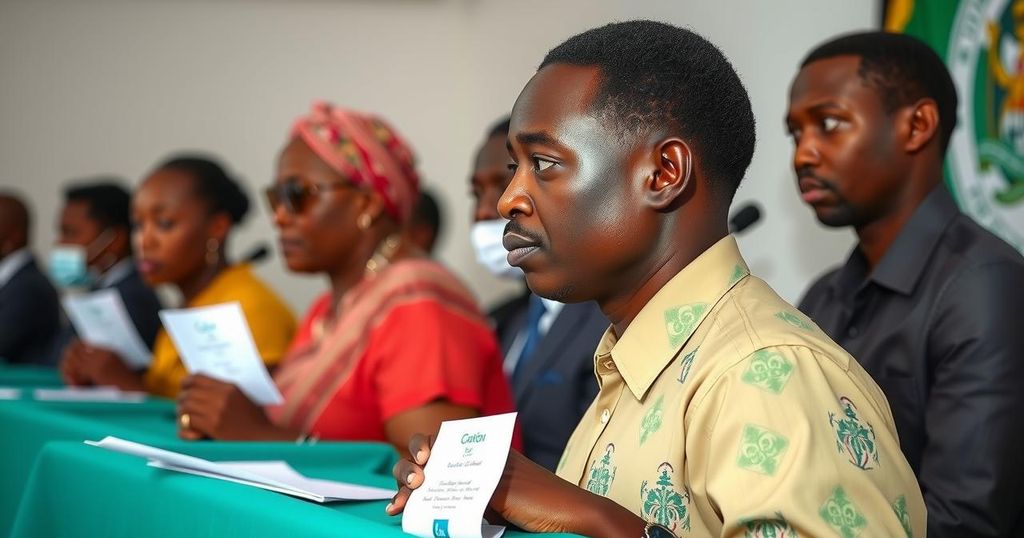Gabon Reports Overwhelming Support for New Constitution Amidst Controversy

Gabon’s military government announced a referendum result showing 91.8% approval for a new constitution, proposing presidential term limits and excluding non-Gabonese spouses from candidacy. Voter turnout was 53.54%, lower than anticipated. Critics are concerned it may lead to dictatorship, while supporters express confidence in military leadership. Economic challenges remain a key issue for the populace.
Gabon’s military government has claimed that a new constitution has received overwhelming approval in a recent referendum, with provisional results indicating that 91.8% of voters supported the text. On Sunday, the transitional Committee for the Transition and Restoration of Institutions (CTRI) made this announcement, highlighting a significant pivot for the oil-rich nation’s governance. The revised constitution proposes a presidential limit of two seven-year terms, eliminates the position of prime minister, and disallows any dynastic succession of power.
The turnout for the referendum was reported at 53.54%, significantly lower than the 71% previously indicated by local broadcasters. Despite heavy state media campaigning urging participation, the election reportedly proceeded without major incidents across the 2,835 polling stations, which operated until 6 p.m. The junta instituted a two-hour extension of the night curfew to midnight for the duration of the electoral process.
The new constitutional provisions mandate that presidential candidates must be exclusively Gabonese citizens, hence excluding former President Ali Bongo Ondimba, whose marriage to a French national disqualifies him. Transitional President Brice Oligui Nguema characterized the referendum as a crucial advance, asserting that “all Gabonese are coming to vote in a transparent fashion.”
Critics, however, labeled the proposal as a mechanism designed to ensure the ruling junta secures significant power. Lawyer Marlene Fabienne Essola Efountame emphasized concerns regarding the potential for authoritarianism, stating, “We are creating a dictator who designs the constitution for himself.” The former president Bongo, originally overthrown amid allegations of fraudulent election practices, had ruled Gabon for 14 years after succeeding his father Omar’s 41-year tenure.
The government has expressed confidence in the transparency of the referendum process, inviting international observers in a bid to restore credibility, especially following the contentious presidential elections in August 2023. Recent surveys indicated that nearly 87% of respondents believed Gabon was on a positive trajectory, although unemployment remains a prevalent concern. Furthermore, over 46% expressed strong confidence in Oligui, positioning him favorably for the upcoming 2025 presidential elections.
The recent referendum in Gabon represents a pivotal moment for the nation, which has been under military rule since August 2022 following the ousting of President Ali Bongo Ondimba. The new constitution aims to reshape the political landscape by introducing significant reforms, including presidential term limits and eligibility criteria that may prevent the former president and his lineage from returning to power. This event is crucial as it unfolds within a context of public dissatisfaction with the previous administration marked by allegations of corruption and misgovernance, alongside the military’s promises of a return to civilian rule within two years. The political climate is further compounded by economic issues such as high unemployment and rising costs of living, which have affected public perception and support for transitional leaders.
In conclusion, the provisional results of the constitutional referendum in Gabon signal strong support for the military’s proposals, emphasizing a transformative moment for the nation’s governance. While the government heralds this as a victory for democracy, dissenting voices raise alarms over possible authoritarianism, framing the changes as potentially self-serving for the junta. The next few years will play a critical role in determining whether these reforms can foster genuine democratic governance or simply entrench military power amid existing economic challenges.
Original Source: www.tiogapublishing.com







